#Chess Records
Explore tagged Tumblr posts
Text

Jimmy Rogers - Looka Here (1958) (AKA: "Look-A-Here" | Previously Unreleased) James A. Lane (Jimmy Rogers) from: ”The Complete Chess Recordings” (1997 Compilation | CD-2)
Blues | Chicago Blues
Tumblr (left click = play) (320kbps)
Personnel: Jimmy Rogers: Vocals / Guitar Otis Spann: Piano ”Mighty” Joe Young: Guitar Willie Dixon: Bass Odie Payne: Drums
Produced by Leonard Chess / Phil Chess / Willie Dixon
Recorded: in Chicago, Illinois USA on May 20, 1958
37 notes
·
View notes
Text
Wayne Cochran - Some-A' Your Sweet Lovin' (1967)
Here's the man with the platinum blonde pompadour, delivering some of his wild, feral soul.
14 notes
·
View notes
Video
youtube
Hound Dog Taylor / Watch Out / Scrappin'
Theodore Roosevelt ''Hound Dog'' Taylor (1915-1975) Watch Out / Scrappin' Recorded circa September 1967 Chess Records Walter Horton - Harmonica
13 notes
·
View notes
Text
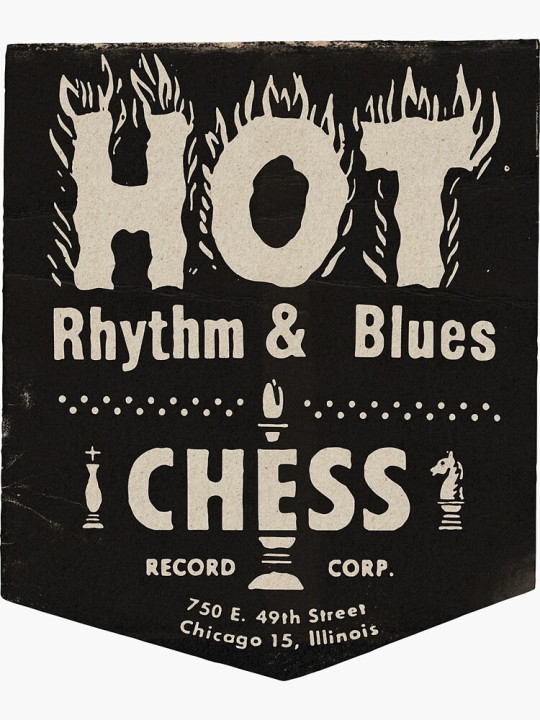
75 notes
·
View notes
Text

James Segrest & Mark Hoffman: Moanin' at Midnight: The Life and Times of Howlin' Wolf (2005)
With all due respect to Charley, Robert, Muddy, B.B., and Buddy, among others, my favorite blues voice is Howlin' Wolf's, and this excellent 2005 biography co-authored by James Segret and Mark Hoffman only grew my admiration for the man behind the howl.
From the plantation in Mississippi to the streets of Memphis and then Chicago, Chester Arthur Burnett (1910-1976) lived and sang the blues: helping to write its history with numerous iconic performances and mentoring an incalculable number of disciples along the way.
As if all that weren't enough, Wolf's imposing physical stature (6'3" tall, 300 pounds) made him a real-life, as well as a musical giant, and his chiseled, granite-like features in old age turned him into a living, Moai-like monolith for his acolytes to worship, though he himself was far too down-to-Earth to have any of it.
It was this primal force and that otherworldly voice that fueled the depth of feeling found in blues standards like "Smokestack Lightning," "Killing Floor," "Natchez Burning," "Evil (Is Going On)," whose arcane power matched their cryptic titles.
In short: Howlin' Wolf's life is the stuff of legend because so many of the musical legends we whisper about reverently today are literally based on his actual life -- that's why we'll never see his like again.
Featured Records:
Howlin' Wolf: Moanin’ in the Moonlight (1959)
Howlin' Wolf: Howlin’ Wolf [a.k.a. 'The Rockin' Chair Album'] (1962)
Buy from: Amazon
#Howlin' Wolf#blues#robert johnson#charley patton#bb King#buddy guy#muddy waters#chess records#sun records#Sam Phillips
5 notes
·
View notes
Text
youtube
It's history that is a huge part of American popular culture, and it happened here in Chicago. A doc on "Record Row" on South Michigan Avenue - Cradle of Rhythm and Blues. Etta James narrates. It's worth the hour. Likely you'll recognize more than a couple tunes...
3 notes
·
View notes
Text
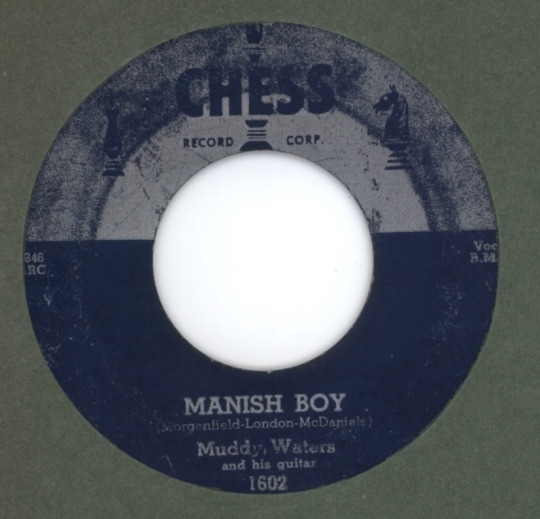
youtube
1955.
The basis for the 1980s staple Bad to the Bone.
14 notes
·
View notes
Text
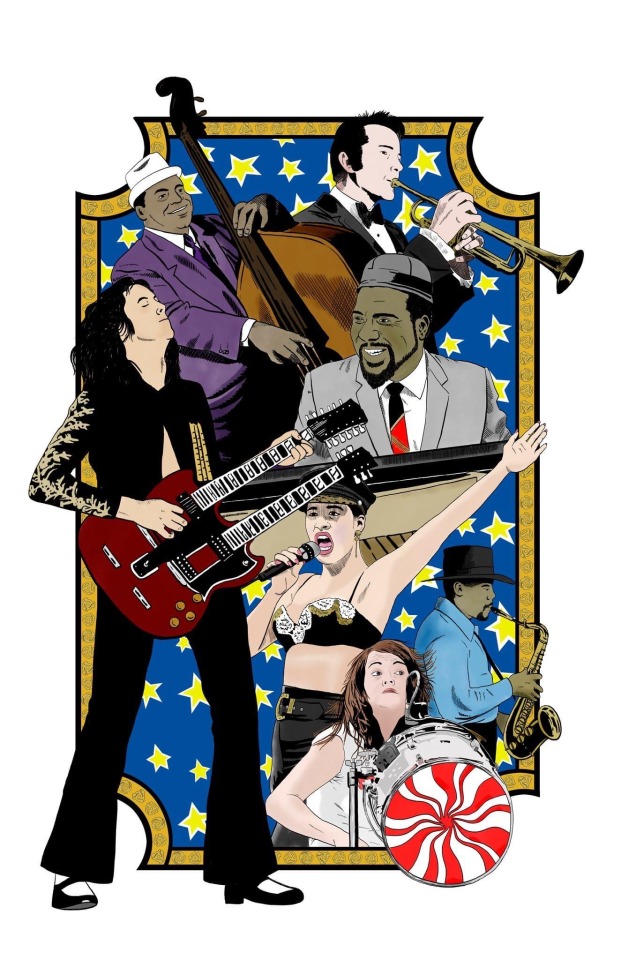
Working on a new project.
#doodles handlon#www.deadcatcomix.com#artists on tumblr#little doodles#illustration#music#jimmy page#led zeppelin#willie dixon#chess records#blues#rock#herb alpert#thelonius monk#jazz#Selena#tejano#meg white#the white stripes#clarence clemons#the e street band
18 notes
·
View notes
Text
youtube
2 notes
·
View notes
Text
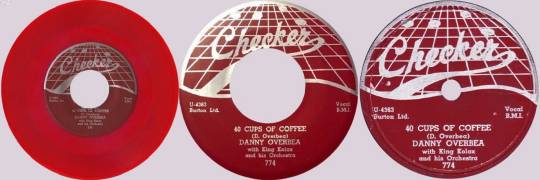
Danny Overbea with King Kolax and His Orchestra - Forty Cups of Coffee (1953) Danny Overbea from: "Forty Cups of Coffee" / "I'll Follow You"
Rhythm & Blues
Tumblr (left click = play) (320kbps)
Personnel: Danny Overbea: Vocals / Guitar King Kolax and His Orchestra: King Kolax: Trumpet Dick Davis: Tenor Saxophone Prentice McCarey: Piano Mentho "Cowboy" Martin: Bass "Little Gates": Drums
Recorded: @ The Chess Records Studios (2120 South Michigan Avenue) in Chicago, Illinois USA during April of 1953
Released: in May of 1953 Checker Records (10" Shellac) (7" 45rpm)
#Forty Cups of Coffee#R&B#1950s#Checker Records#Danny Overbea#Chess Records#King Kolax and His Orchestra
29 notes
·
View notes
Text
Jackie Harris - No Kind of Man (1965)
Funky, funny hipshaking R&B. The always essential tumblr blog, soulmusicsongs posted a video of this song but I'm posting it again as I don't post videos, and it's just too great.
31 notes
·
View notes
Text
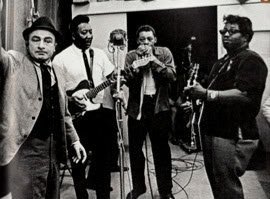
Phil Chess, Muddy Waters, Little Walter and Bo Diddley in Chicago
15 notes
·
View notes
Video
youtube
Chuck Berry - "Deep Feeling" (FS "School Day") - Recorded March 1957
CHESS1653, Chuck Playing Lap Steel
4 notes
·
View notes
Text
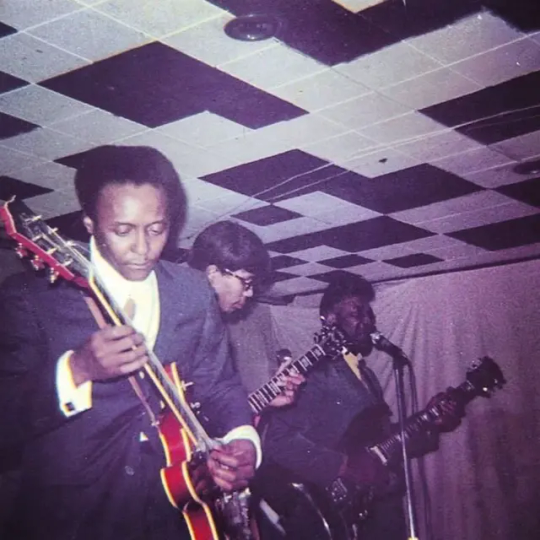
Pee Wee Madison, Luther “Snake Boy” Johnson, Muddy Waters.
10 notes
·
View notes
Text
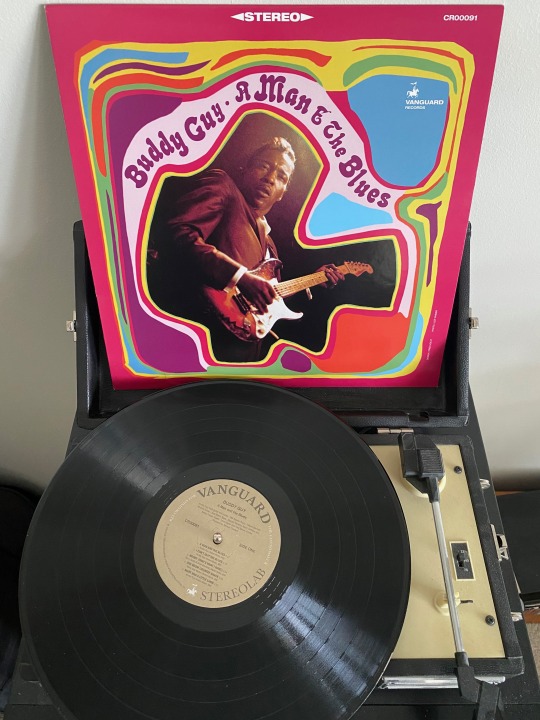

Buddy Guy: A Man & the Blues (1968)
Almost 88-years-old as of this writing, Buddy Guy is a national treasure, the living personification of Chicago blues, and one of the last surviving links to Chess Records' golden age, when he helped write the book on electric, urban blues.
But in 1968, Buddy was moving on from his longtime record label to Vanguard and delivering his first album, A Man & the Blues, but don't worry: he didn't leave the blues behind, as the self-penned title track rhetorically asked:
"What's a man to do when the blues follows him around?"
Well, Buddy was gonna tell us, with a little help from simpatico producer (and legendary jazz and blues historian) Samuel Charters and fellow Chess alums like guitarist Wayne Bennett, drummer Fred Belows and, most notably, pianist Otis Spann.
Together, they apply a coat of cool sophistication to Buddy's fiery, at times histrionic, Chess persona, by nudging slow-boiling ballads like the aforementioned title cut and "Worry, Worry" closer to B.B. King, whose "Sweet Little Angel" Guy also covers here.
All three remind me of nights in the late '90s spent at classy Chicago jazz joints like the Green Mill (often confused for Al Capone's favorite speakeasy, complete with a secret trap door behind the bar), trying to train my Brazilian brain in the city's rich blues history.
But, before you ask, yes, Buddy and band also pick up the tempo for horn-enhanced renditions of "Money (That's What I Want)," "Mary Had a Little Lamb" (later replicated almost verbatim by Stevie Ray Vaughan), and "I Can't Quit the Blues."
All of these swing like a soul music revue and prove that Buddy's versatile vocals, to say nothing of his disciplined guitar licks and fleet-fingered solo runs, could have earned him a living at Stax, just as they did at Chess.
Oh, and on "Just Playing My Axe," Buddy collects some overdue "Inspiration Tax" from The Rolling Stones by re-appropriating the iconic "(I Can't Get No) Satisfaction" riff for his own needs -- I'm sure Keef didn't mind.
Blues fans and critics certainly didn't and embraced A Man & the Blues as a new beginning for Buddy Guy, who spent the next few years performing more frequently to appreciative rock fans, both at large festivals and famous venues of the era.
Unfortunately, though Buddy already had a follow-up album -- the curiously named Hold the Plane! -- in the can by the end of 1969, for some strange reason lost to time, Vanguard didn't deliver it to the marketplace until 1972.
So much for establishing career momentum ... I guess the blues really were following Buddy around.
More Blues: Big Bill Broonzy, Albert Collins, John Lee Hooker, Lightnin’ Hopkins, Son House, Howlin’ Wolf, Elmore James, Etta James, Skip James, Blind Lemon Jefferson, Lonnie Johnson & Victoria Spivey, Robert Johnson, Tommy Johnson, Albert King, B.B. King, Mance Lipscomb, Muddy Waters, Charley Patton, Bessie Smith, Taj Mahal, Peetie Wheatstraw.
#Buddy Guy#blues#chicago blues#vinyl#otis spann#chess records#al capone#the rolling stones#keith richards#albert king#bb kin#stevie ray vaughan#son house#muddy waters#howlin' wolf#taj mahal#lightnin' hopkins#john lee hooker#elmore james#etta james#skip james#robert johnson#charley patton#blind lemon jefferson#tommy johnson#lonnie johnson#peetie wheatstraw
2 notes
·
View notes
Text

Sunday night vinyl...
4 notes
·
View notes